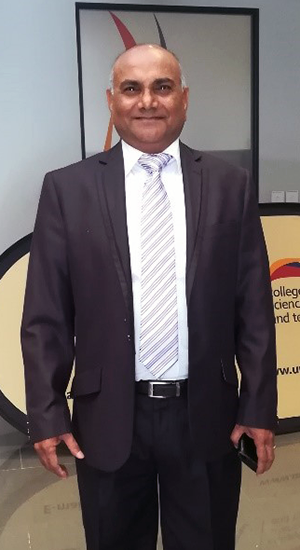News & Events
Unisa produces first Master’s in Industrial Engineering cum laude graduate
Unisa’s introduction of the Master of Engineering (MEng) qualification in 2021 when the Master of Technology (MTech) qualification was phased out, saw the expansion of master’s engineering qualifications at the university beyond the chemical and electrical fields only. This expansion has seen the first MEng graduate in the field of industrial engineering this year.

Tanita Olivier, MEng cum laude graduate
MEng programmes are focused on advanced engineering skills and based on a curriculum focused on knowledge.
Master’s student Tanita Olivier obtained a mark of 80% for her MEng dissertation, while working on her research study aimed at determining whether optimised processes will positively impact individual customer experience management (CXM) scores. She was supervised by Professor Kemlall Ramdass and Professor Kgabo Mokgohloa in the Department of Industrial and Engineering Management at Unisa’s College of Science, Engineering and Technology (CSET).
Olivier will be conferred a degree of Master of Engineering, cum laude, on a date to be confirmed by Unisa’s graduations division. This achievement will further entrench Unisa’s School of Engineering and Built Environment as a leader in engineering while producing leaders in the engineering profession. This will ensure that the school maintains its number one position alongside Northwest University and Stellenbosch University in South Africa as per the 2022 Times Higher Education rankings.
Research in customer experience management
Olivier’s research project delves into various CXM measurement aspects and business process optimisation. It explores critical metrics such as Net Promoter Score (NPS), Customer Satisfaction Score (CSAT), and Customer Effort Score (CES), which are widely used to assess customer satisfaction, loyalty, and ease of customer interactions.
Her research study investigated the impact of optimised business processes on CXM scores. By combining quantitative and qualitative research methods, the study aimed to understand how process optimisation influences the customer experience. The quantitative aspect involved collecting and analysing numerical data collected through surveys. The surveys posed specific questions related to the three CXM scores. The qualitative component involved gathering insights through open-ended questions at the end of the survey to capture customers' subjective experiences and recommendations. The integration of these methods allowed for a more robust analysis of the relationship between process optimisation and CXM scores, providing more valuable insights.

Prof Kemlall Ramdass, Olivier’s research project supervisor
Reflections from the supervisor
“This has been an intensive journey,” says Professor Kemlall Ramdass, Olivier’s research project supervisor and Director of the School of Engineering and Built Environment at CSET. “There were numerous consultations with the student to bring this work to the standard of perfection and quality at which it currently is.”
He continues: “The calibre of graduates that we produce is particularly important. Language was a challenge in the beginning, but the student developed academic writing skills as we went along. Fortunately, the supervisors were exposed to the standard and quality of work and pushed the quality of work to the level attained.”
In closing, Ramdass comments that the School of Engineering and Built Environment at Unisa strives to continue pushing boundaries and attain perfection in what it does, while making a difference to staff, students and industry stakeholders.
* By Dr Nozipho N Gumbi, Communication and Marketing Specialist (acting), Unisa College of Science, Engineering and Technology
Publish date: 2024-03-11 00:00:00.0

